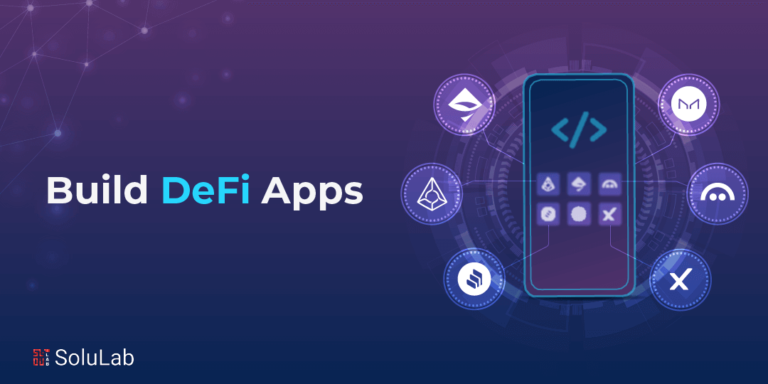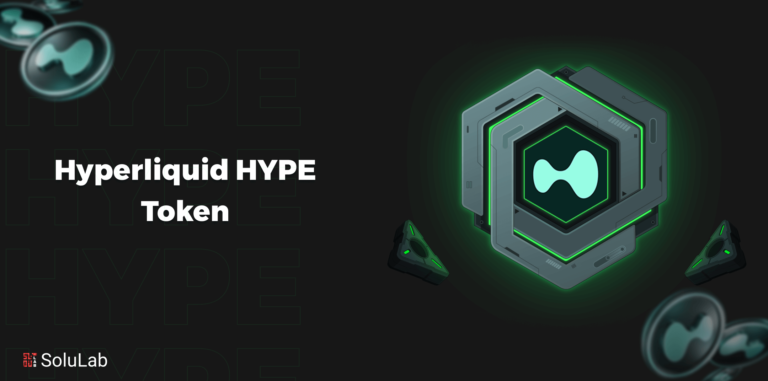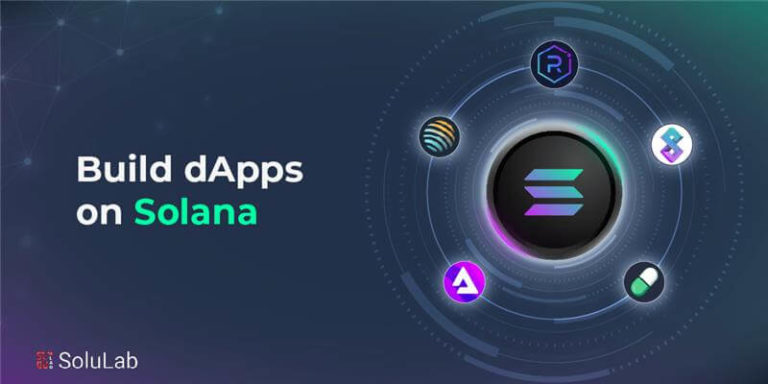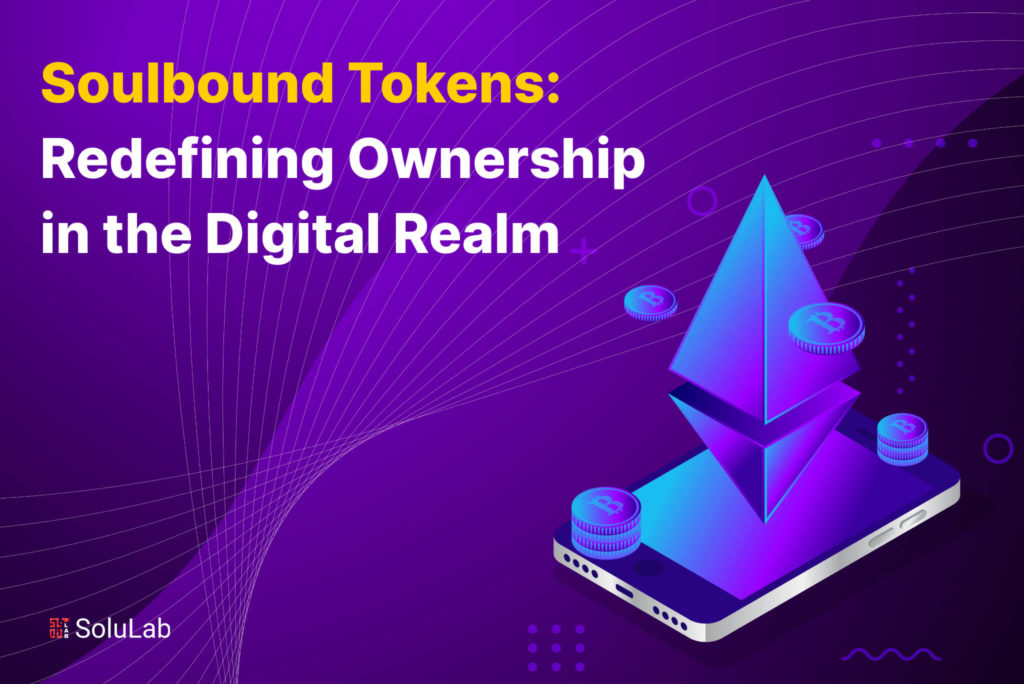
In the rapidly evolving landscape of the digital world, the concept of Soulbound Tokens has emerged as a groundbreaking development. Soulbound Tokens, also called Soulbound NFT (Non-Fungible Tokens), represent a unique form of digital asset ownership. Unlike traditional tokens, these digital entities are intricately tied to their owners, creating an unparalleled bond between the holder and the asset.
Ownership in the digital realm has taken on a new significance, with Soulbound Tokens at the forefront of this paradigm shift. In an era where digital assets are increasingly prevalent, establishing ownership is not just about possession but also about authenticity and uniqueness. The importance of ownership extends beyond tangible assets, encompassing a wide array of digital properties such as art, music, and virtual real estate.
Soulbound Tokens have catalyzed the transformation of ownership in the digital realm. These tokens, underpinned by blockchain technology, ensure unparalleled security and transparency. The transformation is marked by a departure from centralized control, giving individuals true ownership rights.
What are Soulbound Tokens?
Soulbound Tokens represent a revolutionary concept within the realm of blockchain technology and NFTs. Unlike traditional tokens, Soulbound Tokens are uniquely tied to an individual, creating an immutable and personalized connection between the token and its owner. At their core, these tokens are digital assets that encapsulate the essence and identity of the owner, fostering a deeper and more meaningful interaction with the digital world.
How Do Soulbound Tokens Function?
The functionality of Soulbound Tokens hinges on the principles of blockchain technology. Utilizing smart contracts, these tokens are programmed to establish an unbreakable link between the token and its rightful owner. This ensures that the token cannot be transferred or manipulated without the explicit consent of the owner, adding an extra layer of security and personalization to the digital asset.
Soulbound Tokens operate on decentralized networks, ensuring transparency and immutability. Each transaction involving these tokens is recorded on the blockchain, creating an indelible ledger of ownership and transfer history. This functionality not only enhances the security of the token but also enables seamless verification of ownership.
How Has the Concept of Ownership Undergone a Transformative Evolution in the Digital Era?
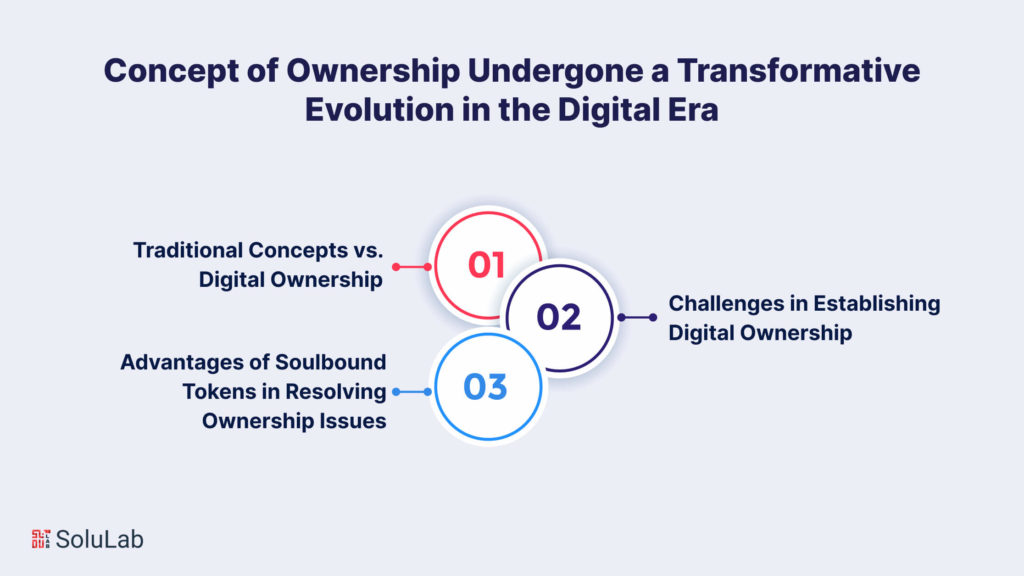
The rapid advancement of technology in the digital era has brought about a profound evolution in the very essence of ownership. Traditional concepts rooted in tangible possession have given way to a new paradigm where digital assets dominate the landscape.
-
Traditional Concepts vs. Digital Ownership
The shift from traditional ownership concepts to digital ownership has been nothing short of revolutionary. In the traditional sense, ownership was often associated with physical possession – a tangible connection between an individual and their property. However, the digital era has introduced a paradigm shift, challenging these conventional notions.
In the realm of traditional ownership, possessing a physical item equated to control and exclusivity. In contrast, digital ownership involves intangible assets like digital files, which necessitate a reevaluation of the very essence of possession. The rise of Soulbound Tokens, particularly in the form of Soulbound NFT Tokens, has emerged as a transformative solution to bridge the gap between traditional and digital ownership.
-
Challenges in Establishing Digital Ownership
Transitioning to digital ownership presents a myriad of challenges, chief among them being the intangibility and replicability of digital assets. Unlike physical objects, digital files can be easily duplicated and distributed without the owner’s consent, raising significant concerns regarding authenticity and provenance.
The decentralized nature of digital platforms also contributes to the complexity of establishing ownership. The absence of a central authority to govern transactions can lead to disputes and uncertainties. Soulbound Tokens address these challenges by providing a secure and transparent framework for digital ownership. These tokens, embedded with unique identifiers, ensure the authenticity and traceability of digital assets.
-
Advantages of Soulbound Tokens in Resolving Ownership Issues
Soulbound Tokens offer a range of advantages in resolving digital ownership issues. Firstly, they provide a cryptographic and immutable link between the owner and the digital asset, offering unparalleled security. The unique identifiers within Soulbound NFT Tokens act as digital certificates of authenticity, eliminating concerns related to counterfeiting and unauthorized replication.
The decentralized nature of Soulbound Tokens also contributes to their versatility. Use cases of Soulbound Tokens extend beyond digital art and collectibles to encompass various domains, including real estate, intellectual property, and even virtual goods within gaming environments. This broad applicability enhances the utility and value of Soulbound Tokens in the digital ownership landscape.
In practical terms, the advantages of Soulbound Tokens are reflected in their ability to establish clear ownership, facilitate transparent transactions, and enable seamless transfer of digital assets. Their integration into blockchain technology ensures a tamper-proof record of ownership, mitigating disputes and fostering trust in the digital ecosystem.
How are Soulbound Tokens Reshaping and Diversifying Various Industries?
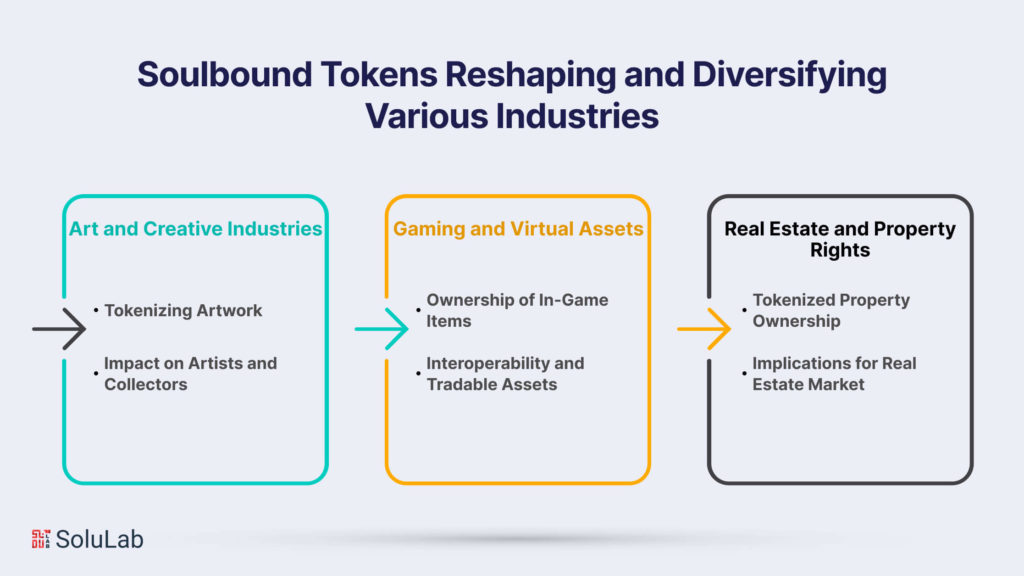
In the realm of non-fungible tokens (NFTs) and blockchain technology , Soulbound Tokens have emerged as a groundbreaking concept with a wide array of applications. Let’s delve into the distinct use cases that showcase the versatility and advantages of Soulbound Tokens.
A. Art and Creative Industries
-
Tokenizing Artwork
Soulbound Tokens revolutionize the art world by enabling the tokenization of artwork. Artists can now create unique digital assets, ensuring provenance and authenticity. Each piece is secured on the blockchain, providing an unalterable record of ownership. This not only safeguards the artist’s intellectual property but also introduces a new level of trust in the art market.
-
Impact on Artists and Collectors
For artists, Soulbound Tokens open up new revenue streams. Through tokenized sales, artists receive a percentage of the resale value every time their work changes hands. Collectors, on the other hand, gain the assurance of owning a genuine piece of art with a transparent and traceable history. This dynamic reshapes the relationship between creators and patrons in the art ecosystem.
B. Gaming and Virtual Assets
-
Ownership of In-Game Items
In the gaming sphere, Soulbound Tokens grant players true ownership of in-game items. Gamers can buy, sell, and trade virtual assets securely on the blockchain, transcending the limitations of centralized gaming platforms. This not only empowers players but also introduces a new economic dimension to virtual worlds.
-
Interoperability and Tradable Assets
Soulbound Tokens foster interoperability among different gaming platforms. Players can use their tokens across various games, unlocking cross-game experiences. Tradable assets, backed by blockchain technology, ensure that virtual items have real-world value. This not only benefits gamers but also creates a more dynamic and interconnected gaming ecosystem.
C. Real Estate and Property Rights
-
Tokenized Property Ownership
The application of Soulbound Tokens extends to the real estate sector, where property ownership undergoes a transformative shift. Properties can be tokenized, enabling fractional ownership and facilitating easier transactions. This innovation reduces barriers to entry for investors and enhances liquidity in the real estate market.
-
Implications for Real Estate Market
The introduction of Soulbound Tokens in real estate has far-reaching implications. It streamlines property transactions, reduces fraud, and enhances transparency. These tokens, representing property rights, facilitate a faster and more efficient market. Additionally, the increased liquidity in the real estate sector attracts a broader range of investors, thereby diversifying the market landscape.
How are Laws Adapting to the Unique Challenges Posed by Soulbound Tokens in the Digital Ownership Landscape?
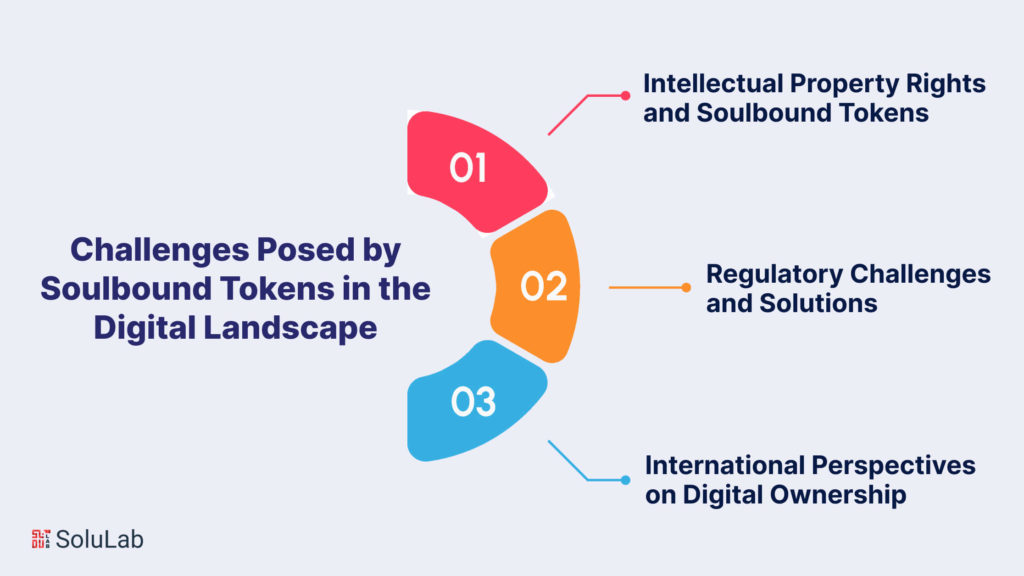
In the rapidly evolving landscape of digital ownership, the intersection of intellectual property rights and emerging technologies like Soulbound Tokens has given rise to a myriad of legal and regulatory considerations. This article delves into the various facets of this complex realm, exploring the intricacies of intellectual property rights, regulatory challenges, and international perspectives surrounding Soulbound Tokens.
-
Intellectual Property Rights and Soulbound Tokens
Soulbound Tokens, a novel form of non-fungible tokens (NFTs), introduce a unique dimension to the realm of digital ownership. These tokens, often associated with digital assets such as art, music, or virtual real estate, prompt a reexamination of traditional notions of intellectual property rights.
As digital entities with distinct characteristics, Soulbound Tokens raise intriguing questions about ownership, licensing, and the protection of creative works. The advantages of Soulbound Tokens lie in their ability to provide verifiable proof of ownership through blockchain technology, ensuring that the true creators and owners are duly recognized.
-
Regulatory Challenges and Solutions
However, the rise of Soulbound Tokens is not without its regulatory challenges. Governments and regulatory bodies around the world are grappling with the need to adapt existing frameworks to encompass the unique features of these tokens. Issues related to taxation, copyright infringement, and consumer protection are at the forefront of regulatory discussions.
To address these challenges, collaborative efforts between industry stakeholders, legal experts, and policymakers are essential. Establishing clear guidelines for the issuance and trading of Soulbound Tokens, along with mechanisms for dispute resolution, is crucial to fostering a regulatory environment that encourages innovation while safeguarding the interests of all parties involved.
- International Perspectives on Digital Ownership
The international perspective on digital ownership varies, reflecting the diverse approaches of different countries. Some nations have embraced the potential of Soulbound Tokens, providing a conducive regulatory environment to foster innovation. Others remain cautious, concerned about the potential risks and implications for existing legal frameworks.
As the global community continues to grapple with the implications of Soulbound Tokens, collaboration and information exchange between countries become imperative. Harmonizing international regulations will contribute to the development of a cohesive framework that facilitates the responsible growth of this burgeoning digital asset ecosystem.
What Obstacles Does the Implementation of Soulbound Tokens Face in the Blockchain Landscape?
The advent of innovative technologies often brings about a wave of excitement and potential, but it is crucial to acknowledge and address the challenges and limitations that accompany these advancements. In the realm of digital assets and blockchain, the emergence of Soulbound Tokens has not been without its set of hurdles. In this section, we explore some key challenges and limitations associated with Soulbound Tokens, touching upon scalability issues, security concerns, and user adoption and education.
-
Scalability Issues
Soulbound Tokens, while offering unique advantages, face scalability challenges that stem from the growing demand for decentralized applications (DApps) and blockchain networks. The scalability bottleneck arises as the number of transactions and users increases, putting strain on the underlying infrastructure.
As the popularity of Soulbound Tokens grows, addressing scalability becomes imperative to ensure seamless transactions and maintain a positive user experience. Implementing scalable solutions, such as layer 2 protocols or optimized consensus mechanisms, becomes essential for the widespread adoption of Soulbound Tokens.
-
Security Concerns
Security is paramount in the world of blockchain and digital assets. Soulbound Tokens, despite their potential advantages, are not immune to security vulnerabilities. The decentralized nature of blockchain makes it challenging to implement centralized security measures, exposing Soulbound Tokens to various risks.
Smart contract vulnerabilities, potential exploits, and unauthorized access to Soulbound NFT Tokens are areas of concern. A comprehensive security framework, including rigorous audits, encryption techniques, and secure wallet practices, is vital to mitigate these risks and build trust among users.
- User Adoption and Education
The success of any blockchain-based innovation heavily relies on user adoption and education. Soulbound Tokens, being a relatively novel concept, face the challenge of gaining widespread acceptance. Users need to understand what Soulbound Tokens are, their advantages, and how they differ from traditional tokens.
The term “Soulbound NFT Tokens” introduces the concept of non-fungible tokens (NFTs) into the equation, further necessitating education on NFT use cases and their unique functionalities. Developing user-friendly interfaces, organizing educational campaigns, and fostering a community that actively engages in discussions can contribute to overcoming the hurdles associated with user adoption and education.
Soulbound Tokens represent a unique category of digital assets that bring a new dimension to blockchain ecosystems. Understanding the challenges and limitations, such as scalability issues, security concerns, and user adoption, is crucial for navigating the evolving landscape of Soulbound Tokens. As the technology matures, addressing these challenges will pave the way for a more resilient and widely accepted ecosystem of Soulbound Tokens.
In the evolution of digital ownership through Soulbound Tokens, what predictions can be made?
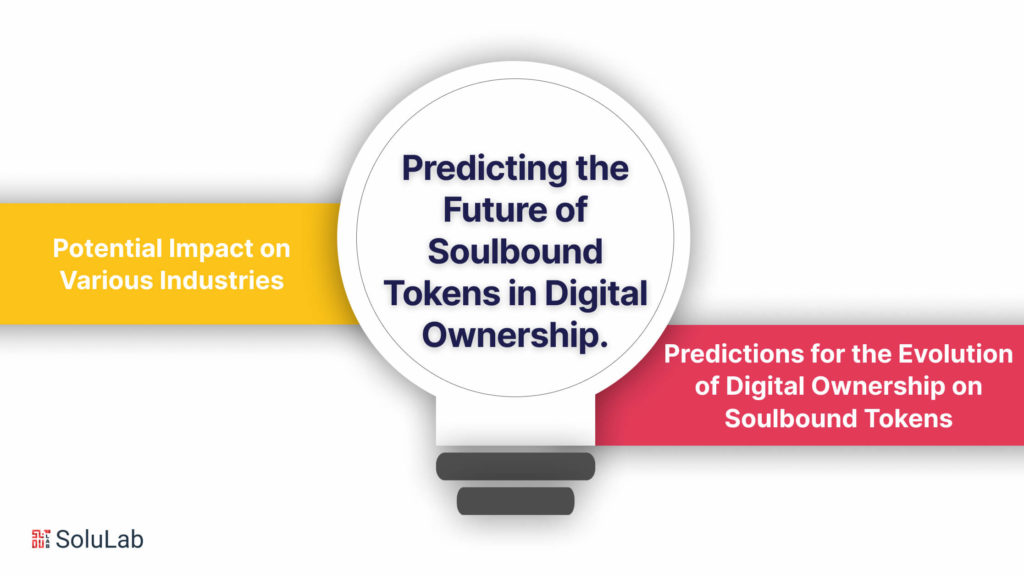
In an era where the digital landscape is continually evolving, the concept of ownership is undergoing a profound transformation, and at the forefront of this revolution are Soulbound Tokens. These unique digital assets, often referred to as Soulbound NFT Tokens, are not merely symbols of ownership; they represent a paradigm shift in the way we perceive and interact with digital property. As we delve into the future, this article explores the groundbreaking innovations anticipated for Soulbound Tokens, their potential impact across diverse industries, and the predictions for the redefinition of digital ownership in the ever-expanding digital realm.
-
Potential Impact on Various Industries
The ripple effect of Soulbound Tokens is anticipated to reverberate across diverse industries. In gaming, for instance, the concept of soulbound items takes on a literal meaning as digital assets become uniquely tied to their owners. The advantages of Soulbound Tokens, including fraud resistance and transparent provenance, can revolutionize the gaming industry by fostering genuine scarcity and ownership of in-game items.
Similarly, the art world is poised for a digital renaissance with Soulbound NFT Tokens. Artists and creators can leverage these tokens to authenticate and protect their digital creations, ushering in a new era of digital art ownership. The potential impact extends to real estate, where Soulbound Tokens could streamline property transactions, offering a secure and transparent way to transfer ownership.
-
Predictions for the Evolution of Digital Ownership on Soulbound Tokens
Looking forward, the evolution of digital ownership through Soulbound Tokens holds exciting prospects. Predictions suggest a paradigm shift in how we perceive and manage digital assets. The term “Soulbound” takes on a deeper meaning as individuals form profound connections with their digital possessions, knowing that these tokens represent not just ownership but a unique part of their digital identity.
The redefinition of ownership in the digital realm is not just a technological advancement but a cultural shift. Soulbound Tokens have the potential to democratize access to digital assets, empowering individuals to truly own and control their digital footprint. As the concept gains traction, we can expect a proliferation of innovative use cases and applications, expanding the horizons of what is possible in the digital ownership space.
Conclusion
In conclusion, SoluLab has emerged as a trailblazer in redefining ownership within the digital realm through the concept of Soulbound Tokens. These tokens, aptly named for their intrinsic connection to the owner, represent a revolutionary leap forward in securing digital assets and establishing a new paradigm of trust and authenticity.
Understanding what Soulbound Tokens are is crucial to appreciating their significance. Essentially, Soulbound Tokens are unique digital assets that are inexorably tied to an individual, much like a soul to its owner. This intrinsic link ensures unparalleled security and transparency in the realm of digital ownership.
In essence, SoluLab’s pioneering work with Soulbound Tokens heralds a new era in digital ownership, one characterized by enhanced security, unprecedented transparency, and boundless possibilities. As the digital landscape continues to evolve, the intrinsic connection between Soulbound Tokens and their owners promises to reshape the way we interact with and value our digital possessions. The journey towards redefining ownership in the digital realm has only just begun, and SoluLab stands at the forefront, steering the course towards a more secure and empowered digital future.
FAQs
1. What are Soulbound Tokens?
Soulbound Tokens represent a revolutionary concept in the digital space, where ownership is redefined through blockchain technology. These tokens are unique non-fungible tokens (NFTs) that establish an unbreakable link between the digital asset and its owner. In essence, they imbue a sense of permanence and exclusivity to digital possessions.
2. How do Soulbound Tokens redefine ownership in the digital realm?
Soulbound Tokens redefine ownership by leveraging blockchain’s decentralized and transparent nature. Unlike traditional digital assets, these tokens use smart contracts to bind the owner to the asset permanently. This ensures a tamper-proof record of ownership and eliminates the risk of unauthorized transfers or duplication.
3. What are the advantages of Soulbound Tokens?
The advantages of Soulbound Tokens are multifaceted. Firstly, they provide secure and verifiable proof of ownership. Additionally, they introduce a level of exclusivity, making digital assets truly unique. The decentralized nature of blockchain ensures transparency, reducing the risk of fraud or manipulation. Lastly, Soulbound Tokens empower creators and owners by fostering a direct and transparent relationship.
4. What are the use cases of Soulbound Tokens?
Soulbound Tokens find applications across various industries. In the art world, they authenticate digital art and provide a secure way to transfer ownership. In gaming, these tokens enable true ownership of in-game assets, allowing players to trade or sell them. Furthermore, they are utilized in the entertainment industry to tokenize exclusive content and ensure fair compensation for creators.
5. Can you elaborate on the applications of Soulbound Tokens?
Soulbound Tokens have diverse applications. They are employed in identity verification, enabling secure and tamper-resistant digital identities. In supply chain management, these tokens enhance transparency and traceability. Moreover, they are utilized in tokenizing real-world assets, such as real estate, bringing liquidity to traditionally illiquid markets.
6. How do Soulbound NFT Tokens differ from traditional NFTs?
Soulbound NFT Tokens differ from traditional NFTs in their approach to ownership. While traditional NFTs represent ownership, Soulbound Tokens go a step further by permanently binding the owner to the asset through smart contracts. This ensures a more robust and secure ownership structure, eliminating the risk of fraudulent transactions.



